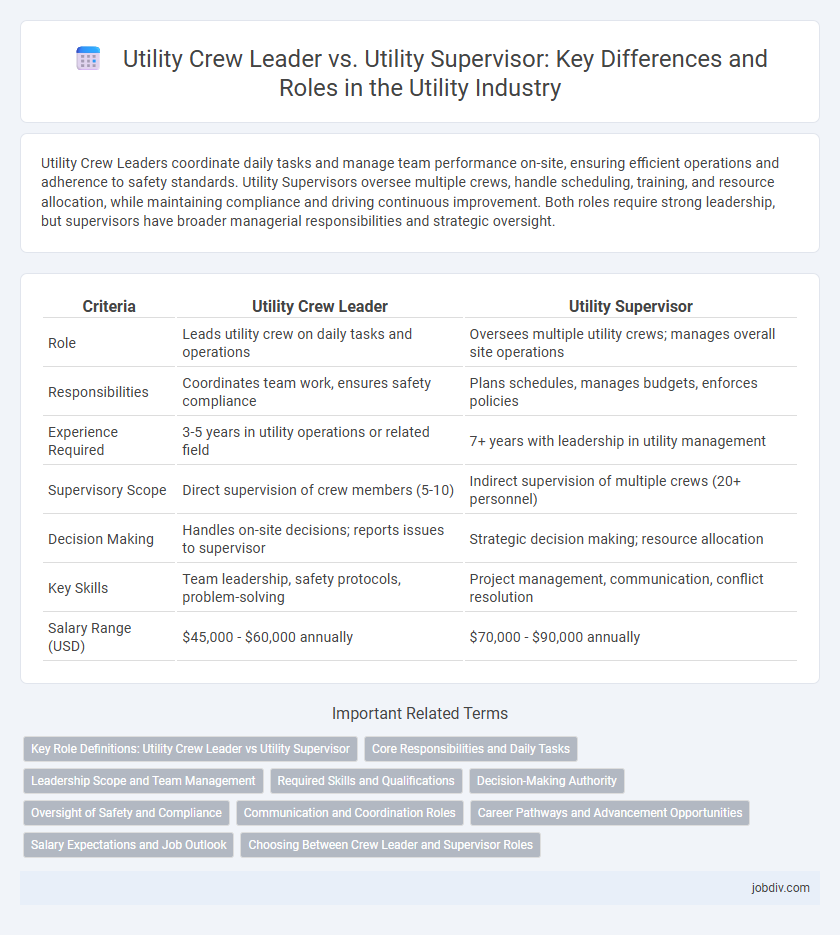Utility Crew Leaders coordinate daily tasks and manage team performance on-site, ensuring efficient operations and adherence to safety standards. Utility Supervisors oversee multiple crews, handle scheduling, training, and resource allocation, while maintaining compliance and driving continuous improvement. Both roles require strong leadership, but supervisors have broader managerial responsibilities and strategic oversight.
Table of Comparison
| Criteria | Utility Crew Leader | Utility Supervisor |
|---|---|---|
| Role | Leads utility crew on daily tasks and operations | Oversees multiple utility crews; manages overall site operations |
| Responsibilities | Coordinates team work, ensures safety compliance | Plans schedules, manages budgets, enforces policies |
| Experience Required | 3-5 years in utility operations or related field | 7+ years with leadership in utility management |
| Supervisory Scope | Direct supervision of crew members (5-10) | Indirect supervision of multiple crews (20+ personnel) |
| Decision Making | Handles on-site decisions; reports issues to supervisor | Strategic decision making; resource allocation |
| Key Skills | Team leadership, safety protocols, problem-solving | Project management, communication, conflict resolution |
| Salary Range (USD) | $45,000 - $60,000 annually | $70,000 - $90,000 annually |
Key Role Definitions: Utility Crew Leader vs Utility Supervisor
Utility Crew Leaders manage daily operations of field crews, ensuring tasks like maintenance, repairs, and installations are executed efficiently while maintaining safety standards. Utility Supervisors oversee multiple crews or departments, focusing on strategic planning, resource allocation, and compliance with regulatory requirements. The key distinction lies in the Crew Leader's hands-on team direction versus the Supervisor's broader operational and managerial responsibilities.
Core Responsibilities and Daily Tasks
Utility Crew Leaders oversee field teams, ensuring efficient execution of maintenance, installation, and repair tasks on utility infrastructure, emphasizing crew coordination and safety compliance. Utility Supervisors manage multiple crews, focusing on project planning, resource allocation, regulatory adherence, and performance monitoring to optimize operational workflow. Both roles require strong leadership and communication skills, but supervisors handle broader strategic responsibilities while crew leaders concentrate on direct team management and task execution.
Leadership Scope and Team Management
Utility Crew Leaders typically oversee smaller teams of 5 to 10 members, focusing on direct task delegation and on-the-ground operations, ensuring efficient workflow and safety compliance. Utility Supervisors manage larger teams, often exceeding 20 personnel, with broader responsibilities including strategic planning, performance evaluations, and coordination across multiple crews to optimize resource allocation. Leadership scope for Supervisors extends to administrative duties and liaising with higher management, while Crew Leaders primarily concentrate on tactical execution and immediate team guidance.
Required Skills and Qualifications
Utility Crew Leaders require strong leadership skills, technical knowledge of utility systems, and the ability to coordinate field operations efficiently. Utility Supervisors must demonstrate advanced management capabilities, including project planning, compliance with safety regulations, and team oversight, alongside in-depth expertise in utility infrastructure. Both roles demand effective communication, problem-solving abilities, and relevant certifications, but supervisors typically hold higher educational qualifications and extensive industry experience.
Decision-Making Authority
Utility Crew Leaders typically oversee daily field operations and make real-time decisions regarding task assignments and safety protocols, ensuring efficient workflow on-site. Utility Supervisors hold broader decision-making authority, including strategic planning, resource allocation, and personnel management across multiple crews or projects. The distinction in authority impacts project outcomes, with supervisors guiding overall priorities and leaders handling immediate operational decisions.
Oversight of Safety and Compliance
Utility Crew Leaders directly oversee field team safety by enforcing protocols and conducting daily safety briefings to ensure compliance with regulatory standards. Utility Supervisors manage broader compliance strategies, analyzing safety performance data and implementing corrective actions to align with federal and state regulations. Both roles are essential for minimizing workplace incidents through vigilant safety oversight and adherence to utility industry compliance requirements.
Communication and Coordination Roles
Utility Crew Leaders primarily manage on-site teams and ensure effective communication between crew members to maintain operational efficiency, while Utility Supervisors oversee broader coordination across multiple crews and departments, facilitating interdepartmental communication and resource allocation. Crew Leaders focus on direct, real-time communication to address immediate workflow and safety concerns, whereas Supervisors develop communication strategies and protocols to enhance long-term project coordination and compliance. Both roles are critical for maintaining seamless workflow in utilities, but Supervisors hold greater responsibility for strategic coordination and multi-team communication management.
Career Pathways and Advancement Opportunities
Utility Crew Leaders typically oversee field operations and coordinate team tasks, serving as a crucial step for advancing into supervisory roles within utility companies. The career pathway from Crew Leader to Utility Supervisor involves gaining leadership experience, mastering project management, and developing proficiency in regulatory compliance and safety protocols. Utility Supervisors manage multiple crews, oversee resource allocation, and engage in strategic planning, representing a significant advancement with broader responsibilities and higher decision-making authority.
Salary Expectations and Job Outlook
Utility Crew Leaders typically earn between $45,000 and $60,000 annually, while Utility Supervisors command higher salaries ranging from $60,000 to $80,000 due to increased responsibilities and leadership roles. The job outlook for both positions remains positive, driven by ongoing infrastructure upgrades and the growing demand for utility services. Supervisory roles offer greater career advancement opportunities, reflecting their critical position in managing teams and ensuring operational efficiency.
Choosing Between Crew Leader and Supervisor Roles
Choosing between a Utility Crew Leader and a Utility Supervisor role depends on the scope of responsibilities and leadership level within the utility sector. A Utility Crew Leader typically manages field operations and coordinates daily tasks among crew members, ensuring efficiency and safety during utility maintenance or installation. In contrast, a Utility Supervisor oversees multiple crews, handles administrative duties, enforces regulatory compliance, and plays a strategic role in project planning and resource allocation.
Utility Crew Leader vs Utility Supervisor Infographic

 jobdiv.com
jobdiv.com